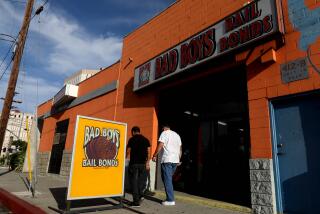Justice Upholds Chicago’s Ban on Spray-Paint Sales
- Share via
WASHINGTON — A Supreme Court justice is allowing Chicago to start enforcing a ban on spray-paint sales within the city in an attempt to curb vandalism by graffiti artists.
Justice John Paul Stevens on Friday turned down an emergency request from spray-paint manufacturers and sellers who sought to have enforcement of the city ordinance postponed until the full Supreme Court considers a formal appeal.
The Chicago City Council enacted the ordinance in 1992, but it never has been enforced. U.S. District Judge Marvin Aspen declared the ordinance unconstitutional in 1993, ruling that it interfered too much with interstate commerce.
During a six-day trial, expert witnesses testified that most of the spray paint sold in Chicago is manufactured outside Illinois. Aspen, told that tens of millions of dollars in sales would be lost, also concluded that the ban would have “no deterrent effect whatsoever” on graffiti.
The U.S. 7th Circuit Court of Appeals reversed Aspen’s ruling last month, saying he used too stringent a legal standard in determining whether the spray-paint sales ban unlawfully burdened interstate commerce.
Aspen had relied on a 1970 Supreme Court decision in weighing the local benefits of the proposed ban against the impact on out-of-state commerce.
But the appeals court ruled that the Chicago ordinance was constitutional because it did not single out out-of-state businesses for adverse treatment.
Such laws should be judged not by the balancing test required under the 1970 Supreme Court test, the appeals court ruled, but under a less stringent standard.
Laws such as the Chicago ordinance should be upheld if they have a “rational basis,” the circuit court said.
“Perhaps Chicago’s City Council has used too broad a brush,” the appeals court ruled. “If so, the law-abiding residents of Chicago will be the losers, for they forfeit the benefits of spray paint without enjoying much, if any, reduction in vandalism.”
But the fact that the ordinance might not work doesn’t mean it is unconstitutional, the appeals court said. “Chicago’s law may well be folly; we are confident that it is constitutional,” it concluded.
More to Read
Sign up for Essential California
The most important California stories and recommendations in your inbox every morning.
You may occasionally receive promotional content from the Los Angeles Times.













